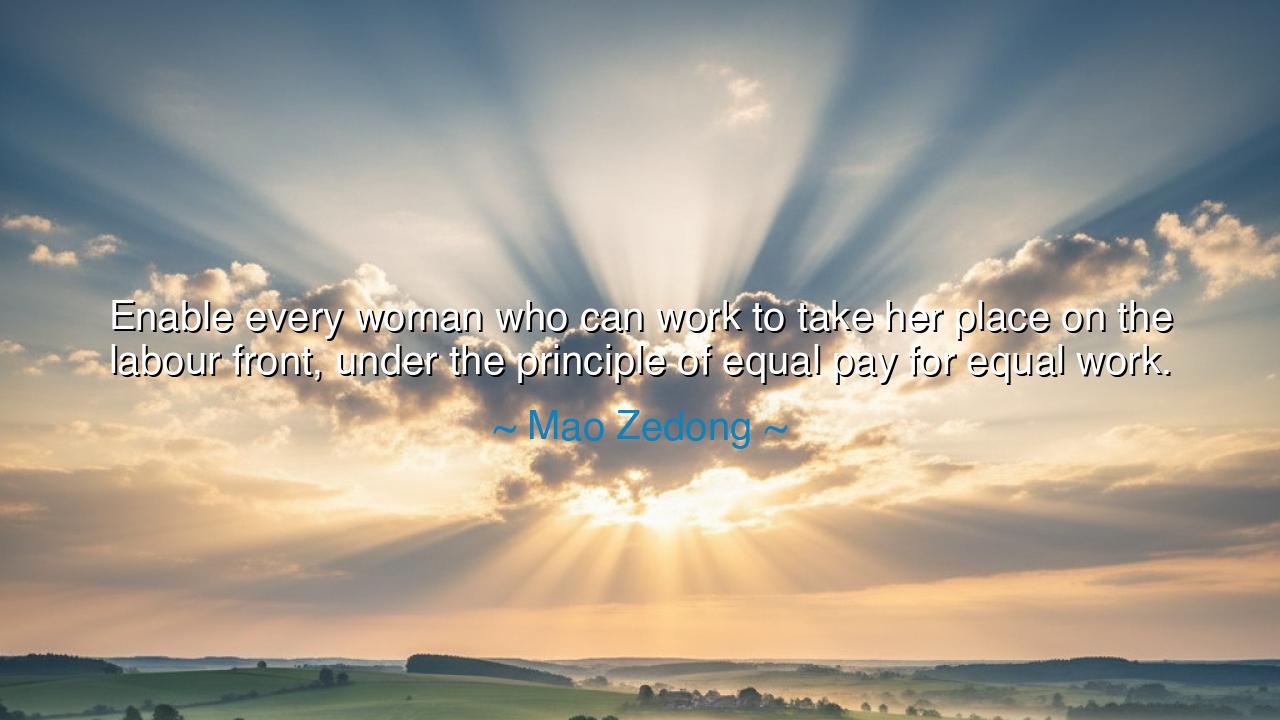
Enable every woman who can work to take her place on the labour
Enable every woman who can work to take her place on the labour front, under the principle of equal pay for equal work.






In the unfolding of society, the strength of a people is measured not by a few, but by the vigor of all who contribute to its toil. Mao Zedong speaks to this enduring principle when he declares, “Enable every woman who can work to take her place on the labour front, under the principle of equal pay for equal work.” These words proclaim a vision of fairness and empowerment, teaching that the prosperity and harmony of the community are sustained only when every capable soul is given opportunity and respect.
To enable every woman who can work is to honor both talent and justice. Mao reminds us that the exclusion of half the population from labor is not merely a loss of effort, but a diminishment of the collective spirit. The ancients, in their wisdom, understood that a society thrives when all who can contribute are given the means to do so, for the strength of the many far surpasses the power of the few. Empowerment is thus both a moral and practical imperative.
The call to take her place on the labour front is a summons to participation and responsibility. It is not a mere symbolic gesture, but an invitation to share fully in the creation and sustenance of the commonwealth. By standing alongside others in effort, women assert their dignity, cultivate skill, and contribute to the shaping of society. In this act, labor becomes not only sustenance but a vessel for recognition, equality, and shared purpose.
The principle of equal pay for equal work is the eternal measure of fairness. Justice, Mao teaches, demands that reward corresponds to contribution, regardless of gender or station. From the courts of ancient kings to the councils of wise elders, humanity has long sought to honor merit above all, for only in equitable exchange can harmony and loyalty flourish. By this standard, every hand that labors is valued, and no soul is diminished by prejudice.
Thus, let this teaching endure: empower all who are capable, uphold the principle of justice, and embrace the labor of the many as sacred. To enable every woman is to strengthen the foundations of the community, to honor the dignity of human effort, and to cultivate a society where merit, fairness, and shared purpose illuminate the path of generations yet to come.






TTTran Dang Thuy Tram Tran
Mao Zedong’s quote seems to reflect a vision where women are not just allowed to work but encouraged to do so under fair conditions. But does the fight for equal pay only focus on numbers, or should we also be focusing on creating work environments that support women’s growth? What steps need to be taken to ensure that the workplace is truly inclusive and empowering for women beyond just pay equality?
HThannah thisis
This quote pushes the idea of gender equality in the workplace, which is crucial. However, it also makes me think about how workplaces are structured. Are they designed to truly accommodate women as equals, or are they still built around outdated notions of gender roles? What concrete steps should society and businesses take to ensure that women not only get equal pay but also equal respect and opportunities in all aspects of work?
TVNguyen Le Tuong Vy
Mao Zedong’s call for women to take their place in the workforce is powerful, but it makes me wonder about the barriers women still face, especially in certain cultures or industries. Even with the principle of equal pay, is it possible that women are still expected to balance work with traditional gender roles, which can affect their career growth? How can we ensure that equality isn’t just a concept but a lived reality for all women?
UGUser Google
The idea of equal pay for equal work is something that resonates with me deeply. But I wonder, how can we truly implement this principle across all industries? In many places, there’s still a significant wage gap between men and women, and it’s not just about pay—it’s about equal opportunities. How can we challenge and change systems that perpetuate this inequality in modern times?
TVNguyen Thuy Vy
Mao Zedong’s quote emphasizes the importance of women’s participation in the workforce and equality in pay, which I find inspiring. It raises an important question, though: how much progress have we really made toward this principle in today’s world? Are women still facing barriers in the workplace despite these ideals, or are there areas where equality is becoming a reality?